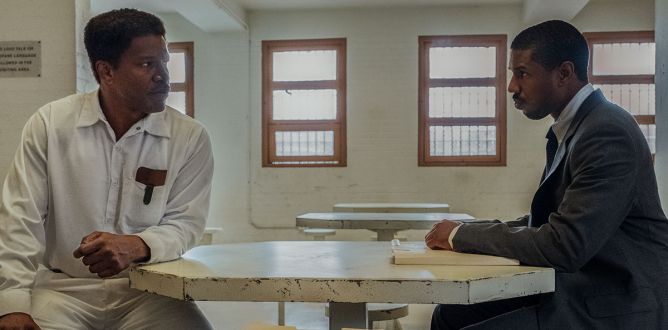Just Mercy Parent Guide
This moving film stands as a damning indictment of injustice and legally sanctioned victimization.
Parent Movie Review
“You don’t know what you into down here in Alabama. When you’re guilty from the moment you born.” So says death row inmate Walter McMillan (Jamie Foxx) to earnest young lawyer Bryan Stevenson (Michael B Jordan). An idealistic graduate of Harvard Law School, Stevenson has moved to Alabama and opened the Equal Justice Initiative, a small office dedicated to helping the most vulnerable victims of the justice system. As he digs into McMillan’s case, Stevenson uncovers a web of perjury, witness intimidation, and undisclosed evidence, eventually realizing that his client is on death row for a murder he did not commit.
Director Destin Daniel Cretton deserves credit for not sensationalizing this case but for providing a measured, dignified retelling of the tragic story. Jamie Foxx’s portrayal of McMillan steals the show but is almost upstaged by Rob Morgan who humanizes Herbert Richardson, a Viet Nam vet whose extreme PTSD was a factor in the homicide for which he admitted culpability. It’s hard to imagine feeling any sympathy for a man who could plant a bomb on someone’s porch, but the emotion in the theater I attended was palpable in the run up to Richardson’s execution. As for Michael B Jordan, he struggles with the same problem faced by any actor portraying an unusually good real-life person: it’s hard to simulate goodness. Jordan spends a lot of time looking worried, which sometimes comes across as confused. Fortunately, his other emotions are clear: his rage over the entrenched racism in the justice system, his shattering heartbreak when he attends a client’s execution, his fear when he’s pulled over by the police. Jordan manages to take us on Stevenson’s journey and feel the emotions that drive him on his quest for justice.
Just Mercy can be a hard film to watch, with scenes that alternately filled me with hopelessness, frustration, and anger. Watching the prosecutor and judge persist in upholding McMillan’s conviction left me wondering if they were bigoted, corrupt, incompetent – or all three. And as I observed Stevenson and his colleague, Evan Ansley (Brie Larson) struggle to lease office space and endure a bomb threat and police harassment, I felt the truth of Stevenson’s published words: “We are all implicated when we allow other people to be mistreated. An absence of compassion can corrupt the decency of a community, a state, a nation. Fear and anger can make us vindictive and abusive, unjust and unfair, until we all suffer from the absence of mercy and we condemn ourselves as much as we victimize others.” This film is a damning indictment of injustice and legally sanctioned victimization.
Fortunately, Just Mercy isn’t 136 minutes of unrelieved darkness. There is hope in the scenes of community and loving support extended to those who suffer. There is hope in the determination of Stevenson and his growing staff to free the innocent and to end capital punishment. And there is hope that their efforts at legal reform will be successful.
Parents considering Just Mercy for family viewing can be assured that the PG-13 rating is appropriate. There is some swearing in the film and a few outbursts of police and prison guard violence and intimidation. Many viewers will be deeply disturbed by a scene where a prison guard forces Stevenson to submit to a strip search before he can see his clients. And there is an extremely upsetting scene where a man is shaved and then strapped into an electric chair. But the scariest moment in the movie comes at the very beginning and it’s a simple phrase on a dark screen: “Based on a true story”. That the horrors of this movie don’t come from the fervid imagination of a screenwriter but emerge from those who are sworn to uphold the law is enough to frighten anyone who believes that “justice for all” is more than just a slogan.
Directed by Destin Daniel Cretton. Starring Michael B. Jordan, Jamie Foxx, and Brie Larson. Running time: 136 minutes. Theatrical release January 10, 2020. Updated February 23, 2024Watch the trailer for Just Mercy
Just Mercy
Rating & Content Info
Why is Just Mercy rated PG-13? Just Mercy is rated PG-13 by the MPAA for thematic content including some racial epithets.
Violence: A scene of execution is shown where a man is strapped into an electric chair. The actual death is not shown but the sound of the electrical charge is audible. There is mention of the strangling and shooting death of a young woman. A guard throws a prisoner against a door. A police officer throws a man against his truck. A prison guard orders a lawyer to submit to a strip search before he can see his client; the lawyer’s bare chest is visible during the procedure. A man briefly mentions killing a woman by placing a bomb on her porch. A police officer throws a man against the door of his car and puts a gun to his head. A woman is told that a bomb has been placed in her house and is going to detonate and kill her family. A man talks about the smell of burning flesh during an execution. A prisoner resists entering his cell; the guards push, hit and beat him. A man is thrown against the courtroom floor and cuffed for arguing with the judge.
Sexual Content: There is a brief mention of a man’s past extra-marital affair.
Profanity: There are two dozen uses of profanity in this movie, including 12 scatological terms, four racial epithets, a couple of terms of deity, and assorted minor curse words and anatomical terms.
Alcohol / Drug Use: An adult character smokes on a couple of occasions and is shown drinking a bottle of beer.
Page last updated February 23, 2024
Just Mercy Parents' Guide
How historically accurate is the film?
Slate: What’s Fact and What’s Fiction in Just Mercy.
For more from Bryan Stevenson, you can watch his 2012 TED talk here:
TED 2012: We need to talk about an injustice
You can read more about the Equal Justice Initiative founded by Bryan Stevenson here:
Other articles about Bryan Stevenson can be read here:
NPR: One Lawyer’s Fight for Young Blacks and “Just Mercy”
Pacific Standard: Bryan Stevenson on What Well Meaning White People Need to Know About Race
The New Yorker: Bryan Stevenson and the Legacy of Lynching
Bryan Stevenson and the EJI aren’t the only people fighting to overturn wrongful convictions. To learn more, check out the Innocence Project.
How common are wrongful convictions? Why are so many people convicted of crimes they did not commit?
Washington Post: Report: Wrongful convictions have stolen at least 20,000 years from innocent defendants
Time: The Wrongly Convicted
Michigan State University: African-Americans More Likely to be Wrongfully Convicted
LA Times: Eight reasons for America’ shameful number of wrongful convictions.
Loved this movie? Try these books…
Bryan Stevenson recounts his lifelong fight against the wrongful conviction and execution of African Americans in his powerful book, Just Mercy. A version for young adults has also been published: Just Mercy: A True Story of the Fight for Justice. Wrongful convictions are also covered in Brandon L Garrett’s Convicting the Innocent: Where Criminal Prosecutions Go Wrong. If you’ve ever wondered how wrongful convictions occur so frequently in a system that is built on the presumption of innocence, you will want to read Blind Injustice: A Former Prosecutor Exposes the Psychology and Politics of Wrongful Convictions. This first person account is written by Mark Godsey, a former prosecutor who now works as a lawyer for the Ohio Innocence Project.
Home Video
The most recent home video release of Just Mercy movie is April 14, 2020. Here are some details…
Related home video titles:
For more about Bryan Stevenson’s fight against wrongful conviction, you can watch True Justice: Bryan Stevenson’s Fight for Equality on this free HBO streaming link: Click here to watch.
Brian Banks is an inspiring, teen-safe, true story about an aspiring football player who is falsely convicted of sexual assault. A fictional tale of wrongful conviction is told in the R-rated If Beale Street Could Talk.
Racial discrimination in the justice system is apparent in The Hate U Give and To Kill a Mockingbird.
Capital punishment is examined from the perspective of those who carry it out in Clemency.


